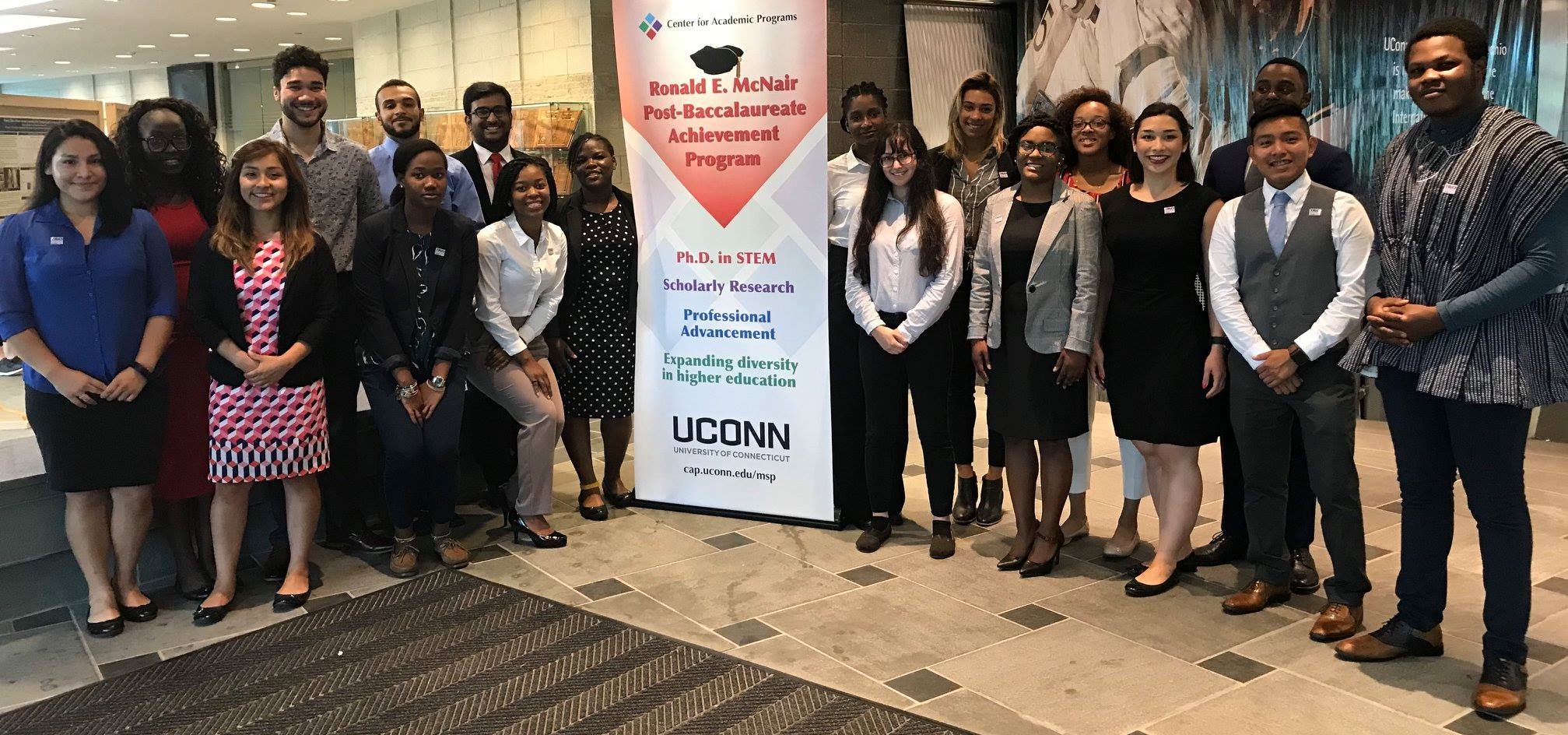
McNair at UConn
The McNair Scholars Program was established at UConn during the 2012-13 academic year. UConn is one of over 206 institutions across the United States receiving funds for this federal TRIO program. The program was developed in honor of Ronald E. McNair and was designed to prepare undergraduate students for doctoral studies through involvement in research and other scholarly activities with the ultimate goal of increasing graduate degree awards for students from underrepresented segments of society.
Within the Center for Access and Postsecondary Success (CAPS), formerly Center for Academic Programs (CAP), in addition to supporting McNair Scholars, the CAPS Research office has also implemented the Apprentice opportunity, which gives students a background in independent research by matching rising first and second year students with project mentors to shadow with their research group for the entire following fall semester. Being an Apprentice gives students perspective about being a researcher, being a graduate student, careers in academia, and prepares them for success as CAPS Research Scholars or McNair Scholars. The CAPS Research office is proud to be serving students for multiple years, year-round, who are CAPS Research Scholars and McNair Scholars.
UConn McNair alumni have gone on to pursue graduate study at a number of institutions including Boston University, Brown University, Harvard University, University of California at Berkeley, UCLA, UMass Chan Morningside Graduate School of Biomedical Sciences, UConn Health, University of Texas at Austin, Duke, University of Virginia, Northeastern, Penn State University, Johns Hopkins, University of Southern California, University of Wisconsin at Madison, Georgia Tech, Colorado State, Northwestern, Mt. Sinai, Baylor, and Weill Cornell.
The McNair Scholars program honors the legacy of Ronald E. McNair (1950-1986)
Biography reproduced from National McNair Scholars Website
 “Ronald Erwin McNair was born October 21, 1950 in Lake City, South Carolina. While in junior high school, Dr. McNair was inspired to work hard and persevere in his studies by his family and by a teacher who recognized his scientific potential and believed in him. Dr. McNair graduated as valedictorian from Carver High School in 1967. In 1971, he graduated magna cum laude and received a Bachelor of Science degree in Physics from North Carolina A&T State University (Greensboro). Dr. McNair then enrolled in the prestigious Massachusetts Institute of Technology. In 1976, at the age of 26, he earned his Ph.D. in laser physics. His dissertation was titled, “Energy Absorption and Vibrational Heating in Molecules Following Intense Laser Excitation.” Dr. McNair was presented an honorary doctorate of Laws from North Carolina A&T State University in 1978, an honorary doctorate of Science from Morris College in 1980, and an honorary doctorate of science from the University of South Carolina in 1984.
“Ronald Erwin McNair was born October 21, 1950 in Lake City, South Carolina. While in junior high school, Dr. McNair was inspired to work hard and persevere in his studies by his family and by a teacher who recognized his scientific potential and believed in him. Dr. McNair graduated as valedictorian from Carver High School in 1967. In 1971, he graduated magna cum laude and received a Bachelor of Science degree in Physics from North Carolina A&T State University (Greensboro). Dr. McNair then enrolled in the prestigious Massachusetts Institute of Technology. In 1976, at the age of 26, he earned his Ph.D. in laser physics. His dissertation was titled, “Energy Absorption and Vibrational Heating in Molecules Following Intense Laser Excitation.” Dr. McNair was presented an honorary doctorate of Laws from North Carolina A&T State University in 1978, an honorary doctorate of Science from Morris College in 1980, and an honorary doctorate of science from the University of South Carolina in 1984.
While working as a staff physicist with Hughes Research Laboratory, Dr. McNair soon became a recognized expert in laser physics. His many distinctions include being a Presidential Scholar (1971-74), a Ford Foundation Fellow (1971-74), a National Fellowship Fund Fellow (1974-75), and a NATO Fellow (1975). He was also a sixth degree black belt in karate and an accomplished saxophonist. Because of his many accomplishments, he was selected by NASA for the space shuttle program in 1978. His first space shuttle mission launched successfully from Kennedy Space Center on February 3, 1984. Dr. Ronald E. McNair was the second African American to fly in space. Two years later he was selected to serve as mission specialist aboard the ill-fated U.S. Challenger space shuttle. He was killed instantly when the Challenger exploded one minute, thirteen seconds after it was launched. Dr. McNair was posthumously awarded the Congressional Space Medal of Honor. After his death in the Challenger Space Shuttle accident on January 28, 1986, members of Congress provided funding for the Ronald E. McNair Post-Baccalaureate Achievement Program. Their goal was to encourage low-income and first-generation college students, and students from historically underrepresented ethnic groups to expand their educational opportunities by enrolling in a Ph.D. program and ultimately pursue an academic career. This program is dedicated to the high standards of achievement inspired by Dr. McNair’s life.”